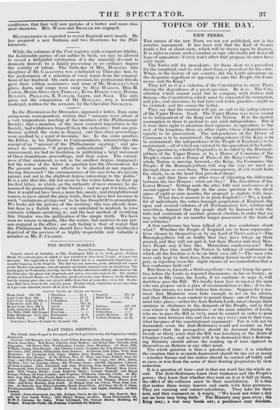In the Harmonicon for December, appeared a letter, from some
anonymous correspondent, stating that "rumours were afloat of a very tempestuous meeting of the members of the Philharmonic Society; that a member, of the most essential importance to the Society, had withdrawn himself from the orchestra ; that one gen- tleman quitted the room in disgust, and that other proceedings were marked by a want of decorum," &c. In the same number, the Editor, in his Notices to Correspondents, acknowledges the receipt of an " account of the Philharmonic meeting," and pro- mises its insertion " if properly authenticated." After this an- nouncement, we had no hesitation in publishing a brief statement of these tumultuous proceedings, and their cause. The correct- ness of that statement, is not, in the smallest degree, impugned ; but the writer of the letter in question (see the Harmonicon for the present month) now affects to be shocked at our report,— having discovered "the circumstances of the ease to be of a private nature, and not in the slightest degree interesting to the public." It is a pity that this did not occur to the writer before he drew up his first letter, in which, on the authority of mere rumour, he de- nounced the proceedings of the Society : and we put it to him, whe- ther it would not have been a more fair, manly, and straightforward course, to have stated the plain truth, than to have had recourse to such "ambiguous givings out" as he has thought fit to promulgate. We broke not the privacy of the meeting; this was already done, but done in a foolish way,—a way calculated to mislead, to raise curiosity without satisfying it; and the best method of rectifying this blunder was the publication of the simple truth. We have seen no reason to impute, like the writer, bad motives to any per- son engaged in the affair; our only feeling is that of regret that the Philharmonic Society should have been (we think needlessly) deprived of the services of so highly respectable and valuable a member as Mr. F. CRAMER.


























 Previous page
Previous page